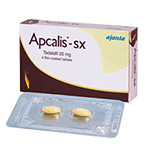What is ReVia?
ReVia (naltrexone) is called “an opiate antagonist”. Naltrexone, the active substance in ReVia, is indicated when, for whatever reason, you want to avoid taking opiates for a while and you are not sure if you can achieve this with other programs. ReVia drug is indicated specifically to:
- those who have not yet developed a heavy heroin addiction and still have good personal and family resources that could allow them to resume a different lifestyle;
- to those who have completed other treatments (community, methadone, etc.) and wish to have a temporary “insurance” against a relapse during the reintegration period;
- to those who leave prison and fear not to resist the first temptations; to those who are following a behavioral psychotherapy;
- to those who are following other types of psychotherapy with good results and are afraid of compromising everything for an occasional relapse;
- to those who are following “Addicts Anonymous” programs.
What is Revia Used For?
Why is naltrexone prescribed to opiate abusers? Since opiates and their antagonists, such as naltrexone, occupy the same receptors these two types of substances compete with each other. This means that if a person introduces opiates but has taken naltrexone before, the opiates cannot make their effect because they find the place “occupied”. In this case, therefore, the administration is not followed by the usual pleasant sensations (and not even by the therapeutic effects) and, for those who abuse these drugs, the reason to take them disappears.
Those who want to start a treatment with naltrexone must stop taking heroin at least 7 days before and stop taking methadone at least 10 days before. Before starting the treatment it can be useful to do a test with naloxone, a short-acting antagonist that allows you to be completely sure that there will be no problems. This drug does not make any effect to those who have not taken opiates for at least a week but causes withdrawal symptoms lasting a few hours in those who did.
Naltrexone is taken by mouth daily or 3 times a week. There are also “retard” preparations to be implanted subcutaneously but they have the disadvantage of not being immediately suspended when, for some reason, it was necessary to do so.
What are the possible side effects?
All drugs can cause side effects in predisposed people. ReVia medication is usually well tolerated but should be taken, like all drugs, under medical supervision. In particular, patients who have liver disease must be followed carefully since, in some cases, naltrexone has worsened the situation.

Some patients presented the following side effects:
- insomnia
- anxiety
- nervousness
- nausea
- fatigue
- headache
- cramps
It is possible that these effects are to be related to an imperfect cessation.
More rare ReVia side effects include.
- appetite disorders
- intestinal disorders
- sexual disorders
- adverse reactions (itching, colds, conjunctivitis, dermatitis, etc.)
It is important to underline that such reactions are reported for a large number of commonly used drugs. On the whole it can be said that ReVia has given less problems than drugs like aspirin or most antibiotics. In any case, any reaction must be reported to the doctor who will decide what to do.
Naltrexone & Alcohol
ReVia is also used for the treatment of alcoholism because a series of studies have shown that, in case of relapse, it reduces the amount of alcohol that is taken. In practice, it does not “pass the desire” to start drinking alcohol but reduces the loss of control, that is, we could say, accelerates the perception of “satiety”. For this reason it has also been used for people who are overweight and struggle to follow a diet due to recurring “binges”.
Is ReVia an opioid?
ReVia is not an opioid, but an opiate antagonist. Opiates are substances similar to heroin, morphine and methadone which produce their effects by acting on certain structures of our nervous system which are called receptors. The opiate antagonists place themselves on the same structures without however activating them, but merely “keeping them occupied”.
What happens if a person first takes opiates and then ReVia? ReVia not only takes the place of opiates in our brains but even “drives out” the opiates it finds on receptors. Therefore, those who take ReVia after taking opiates for a certain period may have a severe withdrawal syndrome which, in addition to everything, is very difficult to treat since the drug has a duration of action of many hours. For this reason, before administering ReVia, it is very important to be sure that the patient is completely detoxified.
So far no one has recorded clinically relevant interactions between naltrexone and other drugs with the exception of opioids. We point out that not only heroin and methadone are opioids but also morphine, buprenorphine, papaverine, etc. In practice, before taking any medication, you should tell your doctor that you are being treated with naltrexone. The drugs that could contain opioids are: analgesics, antitussives, antidiarrheal. Opiates are also used for anesthesia
Is ReVia a controlled substance?
 Naltrexone contained in ReVia is not a recreational drug, nor is it a controlled substance, it is not addictive and does not cause withdrawal syndrome. Those who take naltrexone cannot take opioids, as they would have no effect at normal doses. However for some diseases for which opioids are indicated there is the possibility of using other drugs with good results, at least for a certain period.
Naltrexone contained in ReVia is not a recreational drug, nor is it a controlled substance, it is not addictive and does not cause withdrawal syndrome. Those who take naltrexone cannot take opioids, as they would have no effect at normal doses. However for some diseases for which opioids are indicated there is the possibility of using other drugs with good results, at least for a certain period.
There are not enough studies to guarantee the safety of naltrexone during pregnancy. Therefore not only pregnant women should not be treated, but women treated with naltrexone should suspend it before becoming pregnant. There are no sufficient studies to indicate that the drug is dangerous during pregnancy. In this as in other cases, the problem must be assessed with the gynecologist and the clinical toxicologist. However, ReVia should be avoided in pregnancy.
Revia For Weight Loss
Naltrexone is used as a combination drug Mysimba (naltrexone, bupropion) applied in weight reduction through the effect on brain appetite regulation, a mechanism of action different from existing obesity / obesity drugs. The treatment effect is moderate but in line with previous weight-reducing drugs. Weight loss leads to beneficial effects on cardiovascular risk factors.
Mysimba is an oral treatment and should always be an addition to an intervention program with a calorie-reduced diet and, if possible, physical activity, when these efforts alone are not enough. Indication for treatment is strengthened by the presence of weight-related co-morbidity or at BMI (body mass index) above 35 kg / m². Some patients may suffer from an increase in blood pressure, especially in those who do not lose weight. Blood pressure should therefore be checked before starting and during treatment.
Facts to know about ReVia
Active substance: Naltrexone (an unselective opioid antagonist, without agonist properties, which acts by blocking the body’s receptors for opioids – opium-like narcotic substances).
Mechanism of action: It is not exactly known how naltrexone works in alcohol abuse but is believed to reduce the craving for alcohol when you are alcohol-free, as well as reduce the craving for more alcohol when you have started drinking.
Half-life: A half-life of up to 13 hours allows the drug to be dosed once a day.
Drug interactions: ReVia should not be combined with opioid drugs as their effect is blocked, and should not be given to opioid-dependent patients during ongoing opioid abuse, due to the risk of acute withdrawal problems.
Posted in Addiction Treatment
(5 voices, average: 5 of 5) 3362 views






















